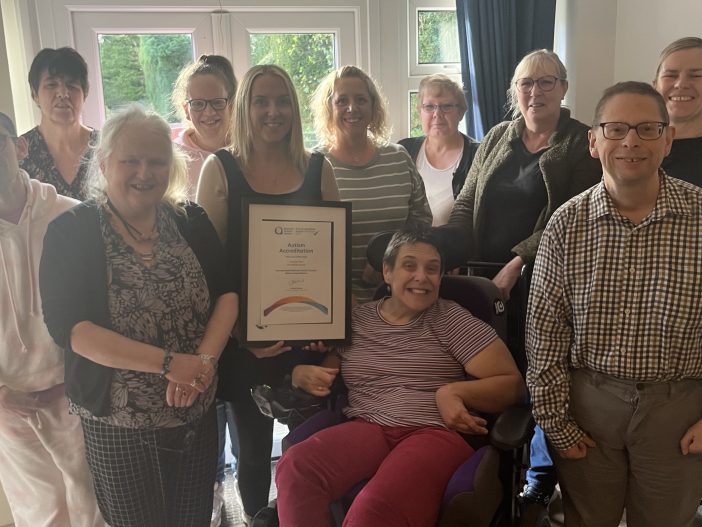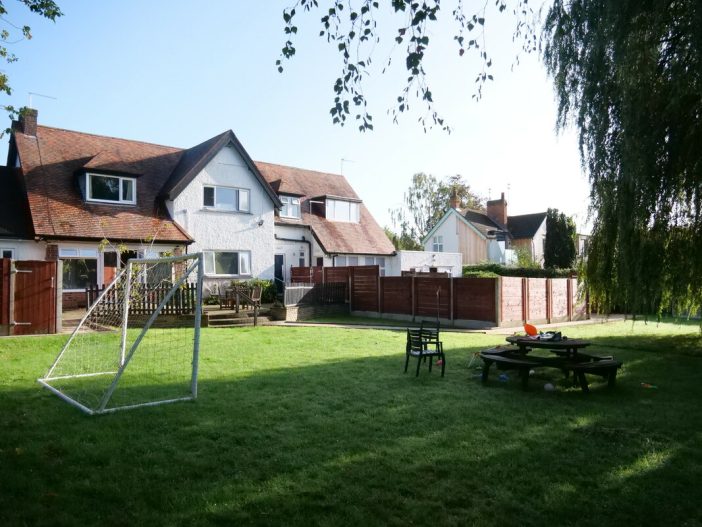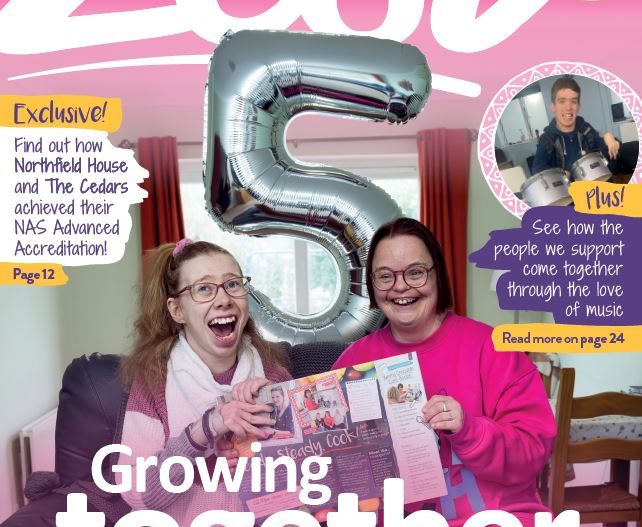Podcast: Brain Injury Rehab support – Outstanding Headway accreditation and achieving outcomes during a pandemic.
Operations Manager Vicki Bennett virtually sits down with Anthea Russell, Service Manager and Peter Riley, Therapy Co-ordinator at our brain injury specialist care home, Woodlands.
In this episode they discuss how the service gained their Outstanding Headway accreditation and how the staff have worked with the people we support to achieve their goals during the pandemic.
Learn more about our brain injury support
We provide specialist care and support to adults with brain injuries in our 18 rehabilitation services across the UK, as well as in transitional and step down properties, out in the community and in people’s own homes.
If you’d like to learn more about how we support people with brain injuries to live their best lives, visit our dedicated webpage. To find out more about Jason’s story at Woodlands, read our case study.
Can’t listen right now?
Read the transcript of the podcast below.
Vicky Bennett:
I’m Vicky Bennett, Operations Manager at brain injury rehabilitation services in the North, and today we’re going to discuss one of our services in Middlesbrough, which is currently rated Outstanding from CQC and has managed to achieve Outstanding from Headway at their last presentation inspection and we’re going to discuss how that was achieved during lockdown, and how we’ve also achieved the outcomes for everyone to potentially move on into other services. I am joined here today, virtually of course because it’s not June yet, we’ve got to keep our distance, by Anthea Russell, Service Manager at the Woodlands, and Peter Riley, the Therapy Co-ordinator at the Woodlands.
Anthea Russell:
Hello, I’m Anthea Russell, the Service Manager at the Woodlands in Acklam, in Middlesbrough.
Vicky Bennett:
Peter, you’re not getting away with being quiet (laughs).
Peter Riley:
My name’s Peter Riley, and I’m the Therapy Co-ordinator for the Woodlands, and I deal with all the therapy and link with the clinicians.
Vicky Bennett:
So, achieving Outstanding from CQC say is quite an amazing thing, especially we’ve got it in three areas. But, we then got hit with a global pandemic, and I think, I think we were all a bit on edge about achieving outcomes with the people we support because a lot of it involves going out, doing day to day tasks, going doing shopping and seeing how people are going to progress in their own flat, for instance. So, for you to achieve outstanding from Headway, which is based on outcome measures is, at it says it is, being Outstanding. So, come on then, let us into it how did you do it? What have you done during lockdown, what’s been so Outstanding?
Anthea Russell:
Well I think we’ve had to completely think out the box we’ve had to think, how are we going to keep all of them residents, mentally stable, happy, content, engaged and stimulated. And to be honest with you, it’s been really hard.
Anthea Russell:
But with that, we’ve developed different strategies with Peter doing in the therapy as well. And we’ve got, we’ve used Alyssa to do activities. What we’ve done is we’ve created different environments. So we’ve created a garden area for somebody who is quite challenging if he doesn’t go out and do his outdoor community things. So we’ve created his own garden, we’re managed to get him to grow lovely plants and to look after them and water them all the vegetables, we’ve got bird gardens. So there’s bird people who want to feed the birds, the bird feeders, we’ve got lots of tires that we’ve filled with compost, growing potatoes and goodness knows what in.
Anthea Russell:
Inside the house, we’ve got millions of boxes of bake a cake, bake biscuits, bake you name it, we’ve got it. And they’re only such as a pound a box, but it’s given everybody the opportunity to be the best cake bakers, so that is what we’re doing, house plants, we’ve all, they’ve all got a house plant that they’ve got to look after and maintain. And that’s the staff as well. And it’s to, we’ve told everybody it’s important to have house plans because the clean the air, this is going to reduce the possibilities of COVID. If it comes into the house, we need to purify the air. So they’ve all taken it quite seriously, growing and looking after things. We’ve changed our ways completely.
Vicky Bennett:
Great. Was there a lot liaising done with the therapy? Cause obviously they couldn’t come in at the beginning and peak of the pandemic, how did it go with them? They were not able to carry out their sessions and measure it this way, is this where Peter came in and kind of hit the ground running a bit more with his role?
Peter Riley:
I think Zoom has been a godsend because we’ve had the therapists on Zoom and in the beginning, it was a bit hit and miss because of the connections and everything. But once everyone sort of got used to it, we were getting the therapist on the Zoom and they’re actually watching and monitoring and assessing how we were doing. And if there was anything I needed to do or tweak, then I was getting a brief off them, which was really, really good.
Peter Riley:
I think, again, as Anthea sort of said, thinking outside the box has been a godsend for everybody, because when you’re doing therapy it’s very sort of this way and that way, but we’ve but the favorite music on for people, we’ve had a Rocky theme tune up and down when they’ve been walking, and it’s a bit of fun, but same time it’s keeping the therapy outcomes there.
Peter Riley:
So I think using that with fun has been a godsend for everybody.
Vicky Bennett:
Definitely. I agree, and I know one of the people we support there, who I know when we open our websites, quite often, I’ll see the faces of our front page person and he’s done his own case study on there. One of his main things as part of his rehab was he wanted to get back into teaching Karate. How has that affected him and how we still kept that up and what alternatives have we done as a service?
Vicky Bennett:
You know, to keep them skills going and that is one of his goals and to carry on with, because it’s out in the open, especially with the amount of touching that goes on and contacts.
Anthea Russell:
He’s very enthusiastic about his teaching certificate, and he’s go delighted that he’s got his first senior belt. So with that, he’s made posters, because he’s very creative and we’ve used the art session as well with all of the residents, cause that’s really brought a lot of peace to them all during their artwork. So he had created his own posters, that’s been laminated and put up around the house to say, karate class will be on a Tuesday and Thursday. I think he slipped another session in as well now. Anybody who wants to either watch or participate can, and there’s usually four or five staff. So it’s usually at lunchtime and they go out into the gardens and he’s got his full karate suit on and his black belt. And he goes through all of the warmup and then he does the karate steps and everybody works with him around it, and then he does his cool down. So it’s given him that confidence to continue and also like a class space as well.
Vicky Bennett:
That’s great stuff, I’m not surprised to know he’s slipped another classes now though, because I’m assuming as the better weather, although today’s to go by or anything, but as the better weather comes in, that’ll be taking place in the garden?
Anthea Russell:
Yeah, all of the karate is outside in the garden, I mean it’s a big enough garden. He’s really enjoyed doing that, and it’s given him ownership as well. You know, he’s a lovely person who wants to share what his skills are.
Vicky Bennett:
Definitely. We’ve got some people who have gained more of their living skills whilst the pandemic been on, because I know we’re had new people move in that are kind of ready to go already, and maybe going back home with their families.
Anthea Russell:
Yeah. We’ve worked really hard with them and with the running, what we’ve done is been able to focus strongly on all of the ADL’s, so the activities of daily living, making a fried egg sandwich, for example, in the sequence that it needs to be done, and knowing they can do it safely. We’ve been working on all of these strategies to make sure that they are participating in doing the things that they would do at home.
Vicky Bennett:
So would you say, we’ve not let the pandemic stop us at the Woodlands?
Anthea Russell:
Pandemic? What pandemic?
Vicky Bennett:
That’s what I like to hear, it is amazing, and very heartwarming to see there is still those outcomes for people and although the world came to a stop, and we all came to a stop, and had to adapt, but then outcomes are still being achieved. It’s heartwarming to see. But, as the inspection obviously, that would have been done very differently because they don’t come to the service. So how did you find that? I mean, adapting to it, and the people we could call, communicating with them?
Anthea Russell:
Well, I think Peter contributed a tremendous amount to that because he had all of his BIR paperwork in place. He had got all this staff on board to say, this is what needs to be done. This is what needs to be monitored. This is what you need to tick and cross and look at. And if they haven’t achieved it, this is what you’ve got to do.
Anthea Russell:
This is how you’ve got to achieve it, and he did work endlessly and it was tiring really because getting a whole staff team, such a huge team to work productively, isn’t easy, but he did, and everybody was getting involved and enjoying watching the people do what you wanted them to do to achieve their goals. You know, just making a cup of tea or making a cake, and the thing was because we were all in lockdown and everybody was in the house, it became that big family environment. So we’re all sharing and caring really.
Vicky Bennett:
Well that’s the aim of the service really, to get people back through their life skills, to go home to family, we need to make it as normal as possible. And unfortunately, over the last 12, 15 months, that’s been everyone’s normal, hasn’t it? You know, we’ve all gelled, we’ve seen a lot more people than we used to and adapt those ways, so basically the pandemic would just continue it on.
Anthea Russell:
I think that’s where it’s been like, and with me and Peter, Pete’s doing the therapy and making sure that all our paperwork was done. I’m sure you’ll agree Peter, wasn’t the easiest. But it became like a situation where I was like the mum figure, and Peter was the dad figure and that went to the staff as well as the residents, and they were always coming in, leaning on us. Oh, can I do this with the residents? You know, or can we do that? Yes. Use your initiative. As long as it’s there is the risk assessment, it’s safe to do it, get them to do it, get them to engage in as much as you can. And it did bring us all together, to a point where you didn’t actually know the difference between the residents and the staff.
Peter Riley:
I think it’s all about being person-centered.
Peter Riley:
I mean that’s why we’re here and that’s what we do, and so we put them the pinnacle of everything, the residents here have felt wanted and, felt that they can do virtually anything. And that’s, that’s our aim really at the end of the day, because both staff and residents suffered because we couldn’t really go out. You couldn’t really do things. We’re restricted on quite a bit of things. But we made that as though the restrictions weren’t there. And that, I think has been the success.
Vicky Bennett:
Wasn’t there somebody who’s goal was to do like money management and trying to organize their finances so that started a tuck shop within the service? So they were working with money a lot more?
Anthea Russell:
Yeah. I mean, obviously they do like to go the shop and chocolate, it doesn’t, it goes down well with everyone at any time of day, stress or no stress and they couldn’t go to the shops and get the things they wanted to.
Anthea Russell:
So this chap, he was a bit frustrated, not being able to go out because he was used to having that freedom, and so we gave him the responsibility for tuck shop. So he would go and buy the bulk of the talk shop in, and although he wanted to talk the prices up, up to make a profit, we insisted there was selling a net price and not making a profit. He did run the talk shop and he ran it well, and it was giving him the ownership because he liked to count the money before, and he liked to write down what he’s sold and he liked to show you how much he’d made that day and to spend again. And so he made a good little accounts book, and it gave him ownership really, and he liked it and all the residents liked it, and he also bought newspapers as well and magazines.
Anthea Russell:
So some of the residents could come and buy the Hello magazine or the newspaper of their choice. The order went on the morning before, and then he would go buy them with the member of staff.
Vicky Bennett:
Okay. There are other things that our services would use, like that book to measure peoples outcomes. Did he achieve that though taking on his tuck shop roll, did he achieve … is his finance? Did he get feedback from the residents when they engaged with him again and see that he’s achieved?
Anthea Russell:
I mean, he managed it quite well. He let us know he had an A level in finances and maths, he’s good, we’ll he’s got an A level in nearly everything, but he’s good with money, so it came easy to him, to achieve what he wanted to set out really, but because of his brain injury, his memory lets him down. So yeah. He managed to meet them goals, really what we expected from him. What do you think, Peter, did you think he did?
Peter Riley:
I did yeah, I mean, it was minimal prompting really. With brain injuries, as we say, you put the prompts there and it sort of, it clicks in every so often and, with Jason, he takes his time a little bit, but he thinks and then it clicks in, so yeah it was minimal prompting, but he got there and I’m really, really chuffed the way he handled it.
Vicky Bennett:
Okay. Well Andrea and Peter, thank you for joining me today for this brief 15 chat, it’s been great and I feel I’ve learned a bit more about the service, and about people and what’s going on during the pandemic I couldn’t be there. If anyone else would like to know more about the Woodlands, or about our brain injury services, then have a visit on our website.
Anthea Russell:
Thank you for having us.

 News & events
News & events 

